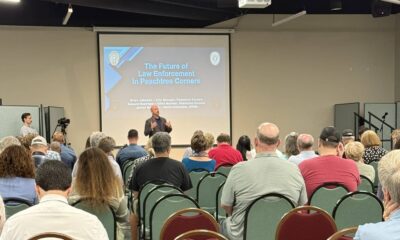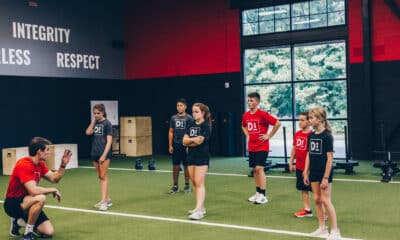Business
Capitalist Sage : Entrepreneurs Creating Mobile Food Events [Podcast]
Published
6 years agoon

The business of food trucks in Atlanta, Geogia
Lentz Pean of Food Trucks Unlimited and Grubbin’ Out ATL joined co-hosts Karl Barham and Rico Figliolini to give his sage advice on mobile food events and the food truck industry.
Lentz Pean is from Boston, Mass and is no stranger to business. In fact, he started running his family corner store at the age of ten. He went from Computer science major, to school teacher, to police officer, then entrepreneur. Currently he owns Food Trucks Unlimited, a food truck fabrication company, Grubbin’ Out, a local metro Atlanta Food Truck and is the Founder and a partner of My Kitchen, a local catering company.

GRUBBIN’ OUT From food truck burgers on the go to corporate events and on-location catering, we’ve got all the ingredients to make Grubbin’ Out one of the best in the city. We also use only the freshest ingredients from local sources to bring incredibly good food and reasonable prices right to your door.
FOOD TRUCKS UNLIMITED Fully customized food trucks, mechanical repairs, equipment upgrades, parts and installation. Visit their Facebook page.
Find our family of podcasts including Capitalist Sage on Spreaker
Podcast transcript follows:
Karl: Welcome to the capital sage podcast, we’re here to bring you advice and tips from seasoned pros and experts to help you improve your business. I’m Carl Barham with TransWorld business advisors and my co-host is Rico Figliolini with Mighty Rockets digital marketing and the publisher of the PeachTreeCorner magazine. Rico how about you introduce our sponsors.
Rico: You know we’re just gripping around with more new sponsors. I love it I love it, So one of our original sponsors was ExploreGwinnett.org. They’re essentially Gwinnett County’s tourist bureau if you will and they run all sorts of events within Gwinnett County so that you can find out all the great food places, the diversity of this County, and all the richness to this County. Visit them at exploregwinnett.org because that’s where you’re going to get most of that information along with the top 10 list of videos that we’ve done together which are great too like the top ten date night places top 10 places to go out with your kids and a bunch of other things like that. Atlanta Tech Park we can’t forget them because this is where we are right now this podcast.
Karl: Right here in Peachtree Corners,
Rico: Yeah this is great this is in technology park these guys have a tremendous amount of businesses working out of here it’s really robust including the Southwest Gwinnett Chambers. Karl you’re based out of here right?
Karl: right
Rico: And even mighty Rockets has a place a seat where we can go to so you can do everything from rent a full Suite or office space here down to even just coming in just for the day and plugging in.
Karl: Absolutely, or even if you have events where you need a room, a meeting room, training room, and a large event space facility for hosting conferences and different events.
Rico: And accommodate several hundred people at that, that’s right the other responsibly had that we have a CMX Center Bistro and they are new to Town Center a great place they’re like a four-star restaurant
Carl: Five-star restaurant
Rico: With the happens to show movies they do everything from scratch in the kitchen and lens those about this because this is what happens in the truck. So beautiful Cuisine stuff, scratch cocktails, they have over a dozen different cocktails they do from scratch the desserts were all from scratch nothing’s Frozen. So a great place if you want to date night that is a great place to be, they’re showing Spider-Man Far From Home this weekend, Toy Story 4 yesterday, which is supposed to be really cool, Annabelle comes home, and Rocket Man. Those are some of the movies playing this week there and a new sponsor that’s coming on is Gwinnett Medical Center so Gwinnett Medical Center is now entering Peachtree Corners that have not been here in the city the can go to be conveniently located in the heart of our thriving Community it’s a new center that’s going to offer first-rate primary care and Specialty Services and if most people know where the Ippolito’s Restaurant used to be that is the building they completely renovated and that’s the building they’re going to be so to learn more about that visit GwinnettMedicalCenter.org forward slash PTC for Peachtree Corners not Peachtree City
Carl: Yeah I love how all these businesses are coming into Peachtree Corners and Gwinnett and just continue to expand. I know people are coming into the Town Centre and some of those other areas will see .
Rico: All these new restaurants.
Carl: Restaurants and just Community coming together they had some of the events over the past couple of weekends.
Rico: We had like seven thousand people at the last concert.
Carl: Concert with the cover band for Queen right.
Rico: Correct, yeah Queen Nation yeah and they have like six cameras pointing into town center down there with facial recognition and they’re able to count so 7000 is a really good number.
Carl: Yeah, absolutely so what today our guest today is Lentz Pean. He’s an entrepreneur, business owner, and also a food truck expert. I don’t know if folks have been able to partake in this food truck movement but I love going around town and seeing all the different options around food trucks. Lentz owns several businesses including food trucks as well as he’s got a business where he’s a food truck architect and helps people bring their Vision to life around food trucks to help build their brand as they’re going out there. But along with that he’s also got some expertise on how to run those kind of businesses and some of the trends that have shifted to make food trucks so popular for a lot of entrepreneurs, and the best part about it he is right here in our back yards in Peachtree Corners in Norcross where he’s operating and employing people in the community and just helping other entrepreneurs navigate all of the licensing the business aspects of it and just help them to be more successful. So, Lentz, I want to thank you for joining us today.
Lentz: Thank you for inviting me I appreciate it.
Carl: Why don’t you tell us a little bit about your journey and getting into this business. I know where you started to where you’ve ended I don’t know that anyone would have predicted that.
Lentz: Yeah, I am born and raised in Boston and I moved here for the Cost of living it was pretty high in Boston so my wife and I moved out here I became a police officer and I worked undercover narcotics. I spent some time on the SWAT team and working undercover we used to eat on food trucks quite often because I mean that’s what we did, and I just had that urge I was like you know why can’t I do this, because I mean it looks easy enough you know and I had some other businesses myself. Came home, told my wife what I’d discovered, and she’s like ah not again, but then we went ahead and I purchased a trailer she named it Grubbing Out and assisted with the menu and that’s where we started.
Karl: Wow, so as you started getting into that what did you notice. You know most people think about getting the food they go into restaurants what did you discover in starting a food truck that was that you found advantageous?
Lentz: Well first off the great part about it was we were able to go to the people instead of the people coming to us so for lunch we’re at Atlanta, for dinner we’re probably in DeKalb somewhere, so we were able to go where the people were and that cut down on our overhead costs significantly. We weren’t having to pay for electricity bills, and this and that and the other so it made it very easy for us to navigate and become known in the in this in the city because we’re everywhere so.
Karl: How about some of the things like as food trucks are to grow the regulation and controls and so on that.
Lentz: Permitting is tough, yeah it really is, you have to know what you’re doing because every county needs a health department, the health department needs to inspect your truck. Oftentimes trucks don’t realize that on any given day if you go from Fulton County to DeKalb County you may be inspected twice in the same day because you’re in different counties. That’s something you guys food truck owners fail to realize that permitting plays a big role in the city often times in different cities you need every city possibly can need a permit for every city along with your Fulton County or DeKalb County Health Department. Yeah and then the fire department they need to inspect you as well for every County, so it’s a lot of paperwork and behind the scenes.
Rico: So what are you dealing with when you’re saying you’re in Fulton for lunch and then Dekalb for dinner how many departments are you actually dealing with?
Lentz: well you’re dealing with the fire department you’re dealing with the city of Atlanta you’re dealing with the Fulton County Health Department so you’re dealing with three different
Rico: Just in Fulton County alone.
Lentz: Just in Fulton County alone and do you need to say where you’re going to be though yes you also need to provide them with a route list of where you going to be and if you don’t you can face some fines for that.
Karl: Hm, I wonder if someone was thinking of starting a food truck what would be the first things you would advise them to consider before they make that plunge.
Lentz: I would tell him to don’t try to reinvent the wheel. I mean it food truck the industry in itself it’s cool enough and also keeps it basic keep it simple eight to ten menu items on your menu which is fine and watch your food costs and factor in employees employees employees. It’s tough to find good help.
Rico: Do they meet you at where you go, or do you pick them up along the way?
Lentz: Well it depends on your finances is it really depends on my guys you know they I don’t work the truck anymore so my guys are all full time so they meet at the kitchen and they prep the food and then they load it and then they go so they’re on the truck all day. But there was a time where I was I pick people up and they’ll meet me at events and things like that so yeah.
Karl: Well you mentioned prepping the food so besides having the food truck where people able to make food and to get it out explain how working with the kitchens work into that whole process.
Lentz: What a lot of trucks fail to realize as well is to operate in the state of Georgia you need to be affiliated with a commissary kitchen a base of operation where you prep your food. And I realize that pretty early in the game after I had already purchased the truck that I did have some sort of overhead. I have to pay for a kitchen and so early on I realized that’s why well why can’t I just create my own like what’s the point of paying someone else to do this for me so that’s when I started the second business which is my kitchen and that is a shared facility where I mentor and monitor and cook and prep all of the food and now we prep food for almost 30 food trucks now. And we’re rocking and rolling right here in Peachtree Corners so it’s pretty cool.
Karl: Wow so the first thing is getting a truck, and getting permitting, and so on determine your menu to turn into business getting aligned with the kitchen space for folks too. Do you ever see where people start off with a food truck and then evolve into a retail space?
Lentz: Yeah actually one of my mentors Will Turner he started the Black Skin Food Truck years ago. He’s one of the guys that got me in the right direction in the industry he actually had started with just a truck now he has a restaurant right here in Peachtree Corners called The Black Skin yeah so yeah it’s possible.
Karl: Really good food so I think what’s really interesting about that is you could build your following first and then kind of experiment with your menu before you take the risk of the overhead and if you build a strong enough following you know that they’ll follow you to the restaurant when you get there so it lowers the risk.
Lentz: Exactly, the restaurant industry is a really risky industry so it’s a safer route to do it like that.
Rico: Do you find social media is really important for the food truck?
Lentz: It definitely is nowadays when everyone’s always tweeting getting on Facebook everything so you just put it out there and people will follow.
Rico: Does Yelp actually review?
Lentz: Yelp does review some food trucks yeah
Rico: If you’re not fixed it’s almost like nothing funny about that
Lentz: yeah exactly there’s no address catch it while you can
Karl: I like how you can follow on social media where the trucks are going to be. People being able to do that. What about the part of business forever seeing Food Truck starting to appear in office parks and giving office workers or people in certain areas options. Instead of there’s usually most people have like maybe one hour lunch 30-minute lunch but by the time they have to get to a place and order the food and eat and run back to the office but I’m always curious how do people get spots how do they know where to go and how was that managed?
Lentz: Well it’s first off a lot of that is done through organizers and through coalitions. There are several food truck coalition’s that are out there and there are a lot of organizers that’s all they do. They create a company and they will market to complexes and business and say “hey look I have x number of food truck owners that work and that I’m affiliated with. Do you mind if I partner up with you all and then create a rotation where every day a different truck is out there?” Oftentimes the owner of the food truck will solicit themselves and just say “Hey, is it okay if I come out here every Tuesday and vend at your location?”
Rico: So short of if you get approval on something like that lets for a line to Tech Park let’s say and you can be out here you don’t need a permit to be out here
Lentz: Yes you do need a permit you need a Gwinnett mobile permit which is that from the health department. And then you need to go ahead and get a signed permission letter from the establishment stating that you have permission to be there. And then you have to give the health department your route list and let them know “Hey, I will be here and these are the times I’ll be here”
Rico: So it’s not like you could do it on the spur of the moment. That you do have some planning.
Lentz: Yeah that process can take all about a week, week and a half, it’s not a big long process but it is paperwork behind it.
Rico: You know what I’m interested in if you don’t mind that the truck is the biggest investment it seems.
Lentz: Yes it is
Rico: What how where do you go where do you buy the truck is it custom-built is there a place that actually makes these?
Lentz: Yeah and that leads us to my third company. What I realized you know my truck would break down. Even I have the kitchens I wasn’t paying for a kitchen but then my out have truck issues that would have maintenance and my fryer would break or it will be wear and tear on the inside. So I hired a great group of guys and I and I and I noticed being in the food truck itself I noticed why I wouldn’t do certain things. So now I build food trucks as well it’s called Food Trucks Unlimited, and we’re right here in Duluth and we custom make all of our food trucks so you can yeah whatever you desire we can do for you.
Rico: Square footage it doesn’t matter?
Lentz: Yes,
Karl: So what is that process like, like if I came in with an idea for a food truck what is it how did it start to get the ideas formulated on what you’re going to build?
Lentz: First, I would say I have a consultation with them and I try to figure out what their menu is. From when I figure out what their menu is then I can take him to a truck and then we can say ok since if you’re going to be cooking this produce and that produce and this and that and the other you may need two fryers and one Grill and one and then figure it out from there. But sometimes their menu items are just way too big and we never even make it to the food I’m not going to sell you something that I don’t think is going to be useful to you. So it’s mainly done first from the menu.
Rico: And if I remember correctly from my days of looking at restaurants because I thought I’d open up one I mean you have to worry about cross-contamination you have to worry about certain foods. Maybe yes you’re going to do one Seafood maybe you shouldn’t even do it because,
Lentz: Exactly so that’s why that’s where the menu comes that comes in if you’re going to be frying fish you can’t fry fish and fry french fries and some people don’t realize it. And it’s yeah bad combination.
Karl: So what are popular types of menu items that are good businesses for a food truck that make a good profit can be made that seems to be popular?
Lentz: Well outside of plug-in grubbing out of course well we’re just a simple slider truck honestly. We sell burgers and fries and that’s it we keep it simple. The only choices we sell sliders tacos are always a great anything that you can find a way to put a Twist or a Flare on but still paying homage to the original is always great. You know and burgers tacos they find a way where you can customize it and still have some fun with it.
Karl: So that allows a much faster way to kind of innovate how important is it to change up the menu. I remember there was a grilled cheese truck that up in New York I remember go and they would have like different concoctions of grilled cheese sandwiches but they would rotate through so you don’t go and eat the same thing every day there’s always something new to try.
Lentz: Yeah I’m glad you said that because in New York well I’m from Boston but in the north these guys post in the same exact place every single day so to keep it new and fresh they do have to change up their menus whereas in the South we’re always moving around so that’s why it’s actually more beneficial to hang out with the same menu because it’s new and moving around. It’s so many different cities so you don’t really have that problem of having to recreate a brand-new menu.
Rico: Do you find that festivals or other types of events are more to your liking then just a corporate parking lot?
Lentz: It depends on what lane you want to play. In festivals it can be risky because the buying is risky because you sometimes you go up from 2 to 5, 6, thousand dollars to pay for this festival and God forbid it rains for the weekend or what but there are guys that I know that an industry they’ll go to a festival and they’ll do 30 40 50 thousand that weekend and that’s what they do. And you know whereas other trucks are more comfortable in the day-to-day lunch dinner, lunch dinner, lunch dinner, and make their money that way so.
Karl: Well as you mentioned the kind of economics if we go the investment if someone was planning to start a food truck what would be what would they plan on investing or range of investment when you think about all that startup cost to get started?
Lentz: Well that’s a good question because people somehow think that the food truck life is cheap. It’s not a you know it’s not one of those things you can start up in your basement and have fun with. The investment, it’s somewhere around 50 to probably 75 80 thousand dollars for a used food truck if you’re getting into a brand new food truck yeah it’s going to be anywhere from 95 to $175,000. Of course financing is available but that’s just for the truck itself not alone the permits and the paperwork and you know to start.
Rico: And that’s all the restaurant equipment in the truck. Things that you have to pull out when you finally get to where you’re going because these things that have to sit outside the truck probably.
Lentz: You want coolers, and things like that and tables but yeah to get you started you’re looking at about you know $50, $60.
Rico: You bring your own type of stuff?
Lentz: Yeah I bring my own table that I like when guys hang out by my trucks.
Karl: But then on the flip side you know when you think about trucks that do well how much revenue can a truck that once they get up and running what’s a range that a truck could make a good truck that’s fairly popular?
Lentz: A good truck that’s fairly popular is going to be around 250 to 600k a year.
Karl: That’s amazing and I when I see restaurants there are a lot of restaurants that can I think there’s on the web you can look at a Subway franchise. The average for Subway, they’ll do in a year is about half a million five hundred thousand plus or minus is the average and so a food truck can do what a Subway would do.
Rico: And you can even cookie cut if you will I mean duplicate, clone, another truck doing the same exact thing you make all your food in the one place anyway, right? What are you doing on you’re prepping all the food I guess and then you finish it up in the truck.
Lentz: At one point in time I had four or five grubbing outs in metro Atlanta and I had them out in different cities and different counties and it worked for me. The only thing was I had no life at all so I had to phase it back and just now I just do the one because it’s a lot less pressure.
Rico: So let me ask you something. When you did the multiple trucks because this is it would make sense to me I guess,
Lentz: Go ahead, and I already know what you’re going to ask
Rico: You revenue share with who’s managing that truck you know
Lentz: No I didn’t
Rico: Would that make sense?
Lentz: It would make sense that I wish I would’ve thought about it back then. It would make my life a lot easier but I wanted to be a little greedy with it to get more money and it was harder for me to find really good help and just because you double just because you have a second truck that doesn’t equal the doubling around here your revenue. So it was more advantageous for me to take a step back.
Rico: Right, I can almost see the webcams in the truck yeah how you doing there fella?
Lentz: Oh that was me
Karl: So you know when you think about marketing and building that the first year building your following, what do you think being successful when what helps people be successful in marketing?
Lentz: I think the name has a great deal of help, the name helps oftentimes when your name is too crazy it kind of pigeonholes you in a way like you want to have something that’s not too explicit. You know not too crazy something that is safe enough to go to vend out of a church because a lot of these businesses a lot of these trucks do a lot of money with churches and schools and elementary schools and colleges. But if your name is so obscene that you can’t even get in there then that kind of puts you in a box of nightclubs and random places like that. Facebook is great for marketing of course and any type of social media platform you had it’s always great so.
Karl: So what do you see out in the future food truck. Is there a trend or something that you think might come along and really have a big impact on food trucks going forward?
Lentz: I think we have to fix some legislation with the food truck industry. It’s in Georgia that they still make it really hard for food trucks like I mentioned in the beginning. How every county is if counties are regulated by the state then why is it that Cobb County and Fulton County the DeKalb why isn’t that one Health Department why is it why can’t we have a Universal Health Department that says hey I just inspected that truck 20 minutes ago? You know? But now that we switch counties it’s like a whole new truck and we can’t vend where we want to vend. There’s a probably we have to have permission everywhere we go and in in the North or in other states like you know you can just pull up at any Street and build a following and say hey I’ll be at this location every day if I want to and it’s not like that in the South.
Karl: That’s interesting because I remember there was always in New York and cities like that to food trucks been around ice cream trucks and front and the cards the vendor the hotdog false but they’ve been doing it longer and so I’m sure they’ve evolved.
Rico: You know and I think what happens there if I remember correctly thing in Manhattan a lot is that you know if you had that hot dog vendor there that guy owned that block.
Lentz: Right,
Rico: You didn’t go near that’s like a mafia its kind of like a mob it’s like those magazine racks in supermarkets. Used to be, you’re not in that rack when you place someone but its the same. Yeah, I see why Atlanta wants to sort of control that a little bit, this way you sort of remove that.
Karl: But it’s not been keeping up because you think about Uber how it’s impacted changing taxis. Uber eats, all these different things because the health department by county made sense when most food places were fixed, yes, but now that you’ve got a mobile food good. But never me you know morphing the regulations and so on to serve that because I don’t think it’s going down any time are you seeing more food trucks coming and business picking up?
Lentz: A new food truck opens up almost every day. I swear it feels like it honestly that their faster than ever the industry’s really moving right now.
Karl: Oh good, well I thank you, Lentz, it has been really fascinating learning this. People probably don’t think how big the food truck industry has been and how it is changing food and beverage and having you here sharing some of that it has been helpful. Want to thank you very much for taking time to come and speak with us today we want to thank Atlanta Tech Park for hosting a Capitalist Sage podcast and if you ever want to space borrow rent some space or have a place to work with other entrepreneurs that are looking to build businesses here in the Peachtree Corner Norcross South Gwinnett area definitely worth taking a look at. I’m Karl Barham with Transworld business advisors of Atlanta Peachtree, we help people you know looking from getting from one business to the next whether they’re selling whether they’re buying but they’re just thinking about new businesses to get into. So if you ever need help or conversation on any of those things feel free to reach out to myself at kbarham@tworld.com I did want to say Lentz if folks had questions and how to reach you how would be a good way to reach you?
Lentz: A few different ways, my kitchen you can look it up at www.ktcnspace.com. If you’re looking for kitchen space, if you’re looking for Grubbin Out its info@ grubbinout.com 404-781-8714, and if you’re looking for a food truck to be built it’s foodtrucksunlimited.com and that phone number is 762-244-9502.
Karl: Fabulous, thank you so much for that. So Rico, yeah, what do we got coming up in the near future?
Rico: There are all sorts of stuff. I mean you’ve already lined up but a few guests for Capital Sage is just which is great livinginPeachtreeCorners.com is where you find out all sorts and you can follow up yes front of their will from spreaker.com to search capitalist sage and confirm this or iTunes to do lessons subscribe, follow, and comment on it absolutely iHeartRadio I believe we’re on in Spotify. So anywhere, mostly anywhere you can find podcasts you’ll find us. Just search it on Google and you’ll be able to find us. Myself, I’m just you know do whatever anyone needs me to do creative director social media strategists to physiography. I want to thank Quinn Ofwatch from Whole Duke high school for taking care of the camera work and doing all the direction on the other side of that. If you want to find out more of what I do as for as podcasts and magazines and stuff like that visit Mightyrockets.com or go to that livingatPeachTreeCorners.com and Lentz this was perfect I love the truck.
Lentz: Thank you so much for inviting me, I appreciate it.
Karl: And also don’t forget we have Peach Tree Corner magazine.
Rico: Yes Peach Tree Corner Magazine, we’re working on that actually that’s going to be coming out it’s going to be hitting the mailboxes the first week of August. We have three great stories that come, one story that’s on the film and entertainment industry here in Gwinnett County in Peachtree Corners actually so we’re interviewing a few people for that and that’s cover story you’re doing a story on Boy Scouts on that and eventually, we will be doing the Girl Scouts. But that’ll be another issue and there’s just tons of stuff I’m packing this Magazine with tons of stuff.
Karl: Absolutely,
Rico: We’re going to be hitting 18,800 mailboxes with that issue like we always do.
Karl: Absolutely, and look do go online on Facebook and you can keep up if you want to know what’s going on. Do like, follow, those pages and lots of good information there for folks that want to hear what’s going on, in, and around Peach Tree Corners. Thanks, good, well thank you everybody, thanks Lance for visiting today and look forward to more shows coming up in the near future, thanks everyone.
Related
Business
Peachtree Corners Grows Business Opportunities Through Economic Development
Published
1 week agoon
May 6, 2025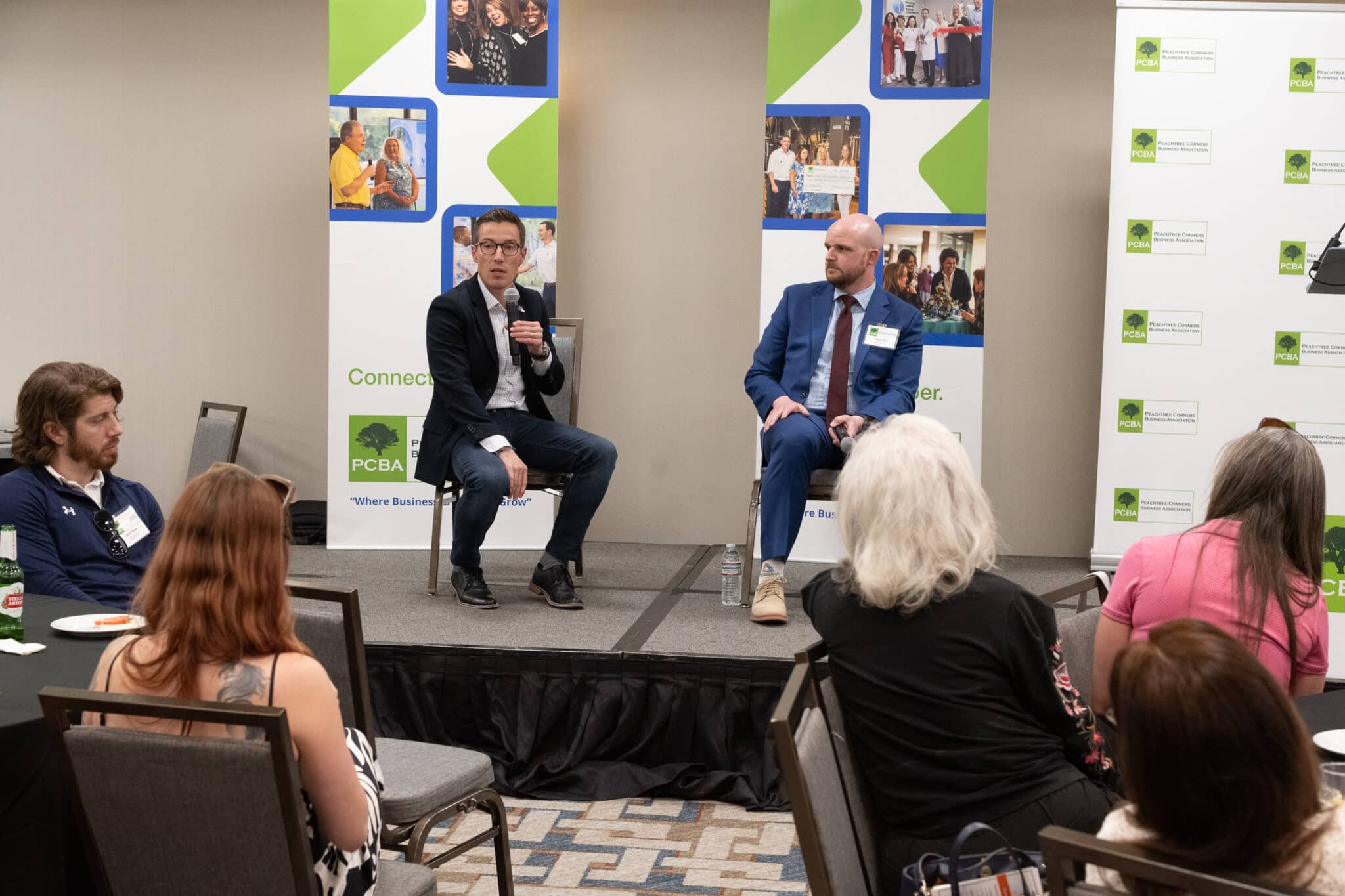
Most residents and business owners in Peachtree Corners probably think they know all about the economic development and strategic planning of Peachtree Corners, but do they really?
Peachtree Corners Business Association invited Peachtree Corners Economic Development Director Betrand Lapoire and Partnership Gwinnett Director of Economic Development Andrew Hickey to its After Hours Speaker Series on March 27 to discuss the city’s growth from a 1971 master plan to a bustling city with 42,000 inhabitants and 40,000 jobs.
Key points included the importance of business retention and expansion, with 24 projects last year creating 1,600 retained jobs, 1,600 new jobs and $250 million in new capital investment.
The Curiosity Lab, a world-class innovation center, was emphasized as a significant attraction. The city’s zoning and infrastructure plans were also discussed, focusing on balancing office and residential development to maintain a vibrant, sustainable community.
Matching jobs to residents
Although Peachtree Corners is just a teenager in terms of being an incorporated city, the foundation for this vibrant, fast-paced economic hub was laid more than 50 years ago by technology pioneer Paul Duke.
“Peachtree Corners was the first master-planned, business innovation technology park in metro Atlanta,” said Lapoire. “It was in response to the brain drain of technology with Georgia Tech graduates leaving the area.”
While the city may have a small-town feel, it’s the largest in Gwinnett County by population, but not land mass, he added.
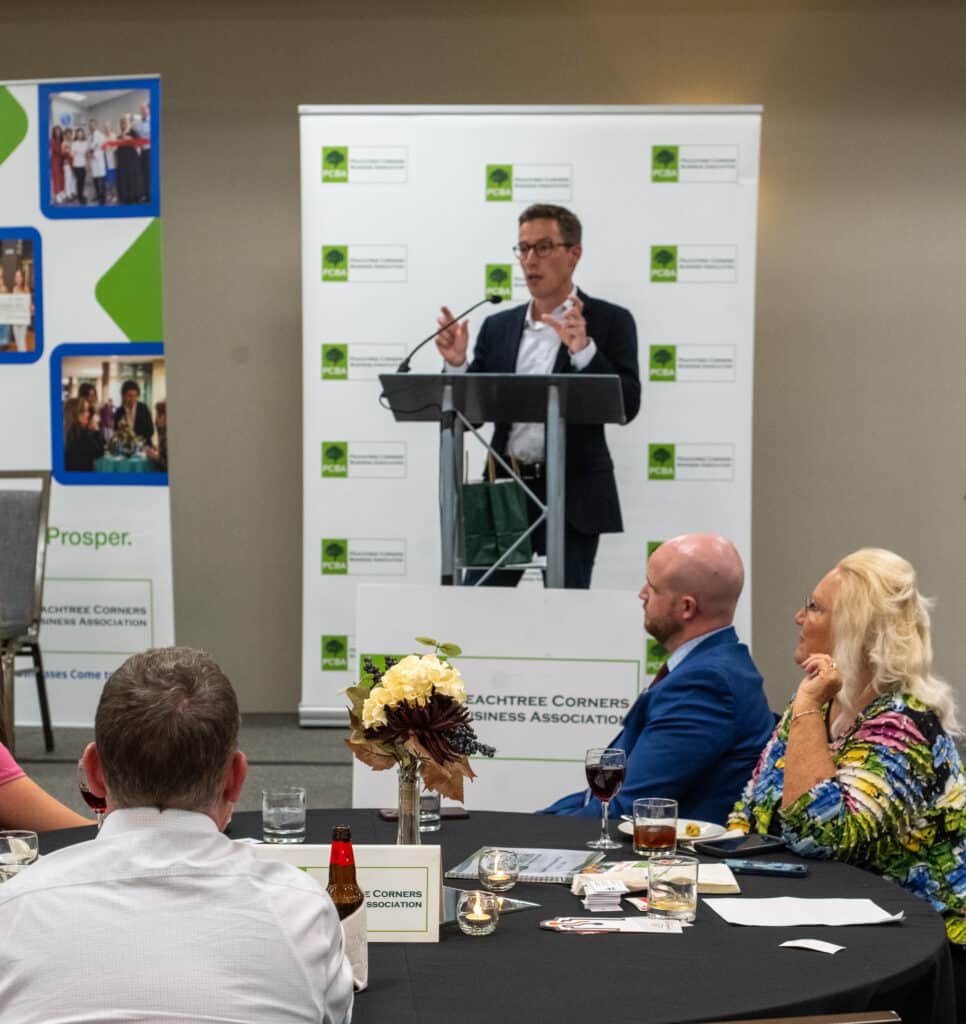
“The city started from a commercial, industrial, R&D base and then was expanded around it,” said Lapoire.
Though home to more than 42,000 residents, most of the jobs in Peachtree Corners are filled by people who live outside the city, he added.
“So we have this interesting mismatch, in a way, although not unusual,” said LaPoire. That creates traffic and transit issues. So that means that one of the solutions is to create more jobs here to fit the profile of the community.”
He presented charts that show professional services, consulting and engineering as the largest job categories. The next tier of businesses are wholesale and manufacturing.
“So we have a good mix of industry,” he said.
A five-year plan
The city has a five-year economic development plan (2023-2028) that outlines strategies for attracting and retaining businesses, with education and workforce development being key components.
Partnership Gwinnett has similar goals as Peachtree Corners, but on a larger scale.
“We are the county’s sales and marketing arm for all 17 cities now, and we receive funding from both municipal sources as well as existing businesses here — both in Gwinnett and outside of Gwinnett as well,” said Hickey.
He shared how Partnership Gwinnett is designed to drive a lot of major corporations toward doing business inside and with Gwinnett County.
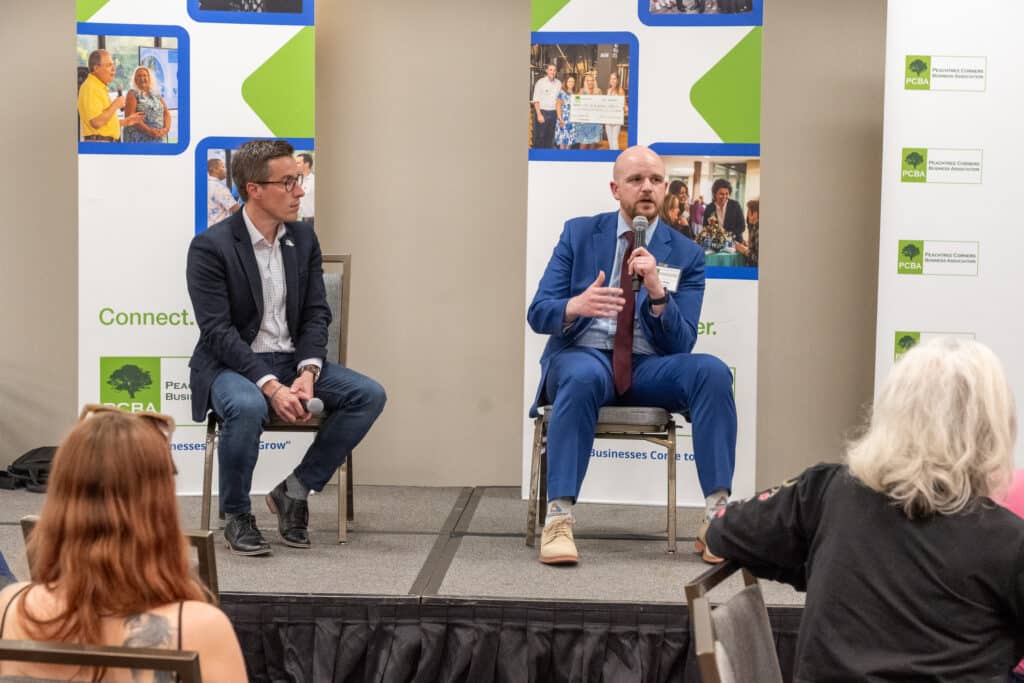
“One of the biggest things that we talk about that I’m sure it seems like most of us here, if you live here, you work here, you understand it. It’s the diversity that exists here in Gwinnett,” he said. “With a diversity index of 85, that means if we walk out of the Hilton here and we say hello to somebody, there’s an 85% chance they’re from a different ethnic or cultural background than ourselves, which to you and I may seem normal because that’s the life that we live in.”
He added that for companies, there’s a tremendous value in that, whether they have stated values, or they’re just making hiring decisions to get a wide range of candidates to fill those roles. Additionally, because of the proximity to Atlanta, Gwinnett County has a great labor draw.
Partnership Gwinnett
Partnership Gwinnett plays a significant role in recruiting businesses, expanding existing companies and developing the workforce. Hickey showed how the organization was involved with more than 24 projects last year.
“A majority of those were expansions, and that is a common thread you’ll see in economic development,” he said. “In business retention, expansion is so vital to working with our existing companies to make sure that they have the resources they need.”
He added that’s what leads to new investment and job creation in the community.
The organization also focuses on redevelopment projects, working with cities and the county to improve infrastructure and community amenities — especially strong educational institutions such Georgia Gwinnett College, Philadelphia College of Osteopathic Medicine and others.
Quality of life
In closing, both men stressed the importance of recruiting companies and developing the workforce, along with one aspect that means a lot but may not be as obvious — quality of life.
“It’s definitely evident that people like to work where they live — the whole live, work play experience,” said Hickey. “I joke that the part that people really have the most questions about, and are most excited to learn about, is new events at The Forum or Gwinnett Place Mall.”
Although they want to know what’s the next major company coming to Gwinnett, people REALLY want to know about how to spend their leisure time.
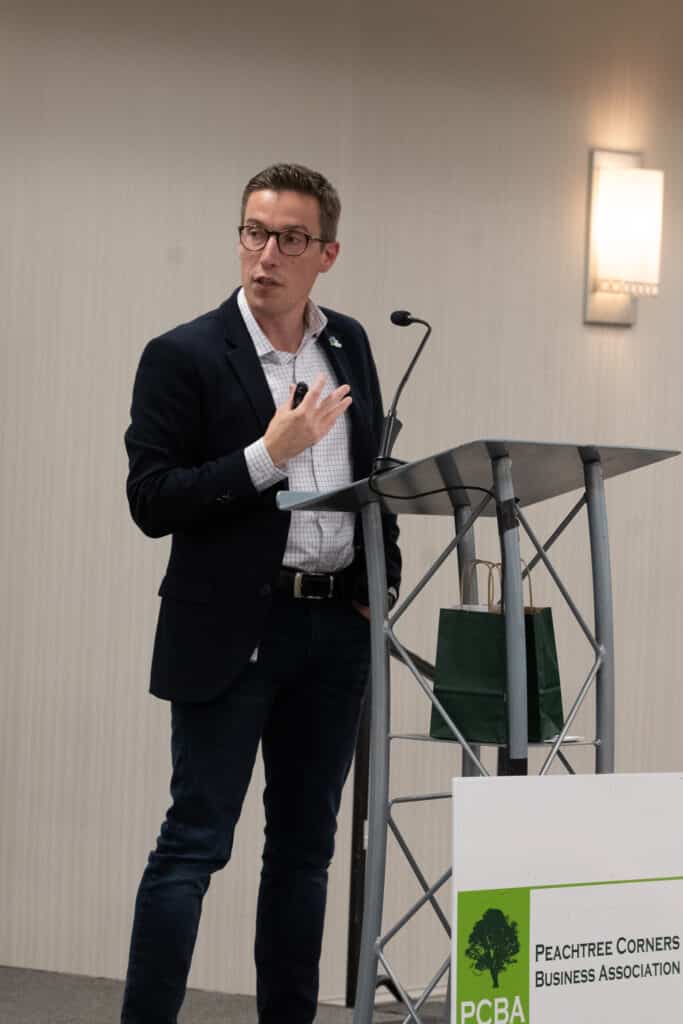
“That speaks to the importance of ensuring that we have a great community,” he said. “So at Partnership Gwinnett we work with all of our cities, and the county government as well, [on] a kind of a best-practices trip.”
He added that the peer tour allows everyone to know what the neighboring communities are doing and share the good news.
“We will take all of these elected officials, but also city staff, to different cities across the Southeast,” he said. “Last year, I believe they went to Huntsville, and have been to Greenville, Chattanooga — all cities that have done some really cool redevelopments that have taken their city to the next level. Our goal is to learn from them.”
Related
Business
Two Peachtree Corners Business Leaders Named Finalists for EY Entrepreneur Award
Published
3 weeks agoon
April 23, 2025
Ernst & Young’s Entrepreneur Of The Year celebrates ambitious entrepreneurs who are shaping the future
Ernst & Young LLP (EY US) recently announced the finalists for the prestigious Entrepreneur Of The Year 2025 Southeast Award, and two local, Peachtree Corners business leaders — David Quirk, president and CEO of DLB Associates Consulting Engineers PC and Erin Hanson, founder and CEO of Guardian Sports — made the list.
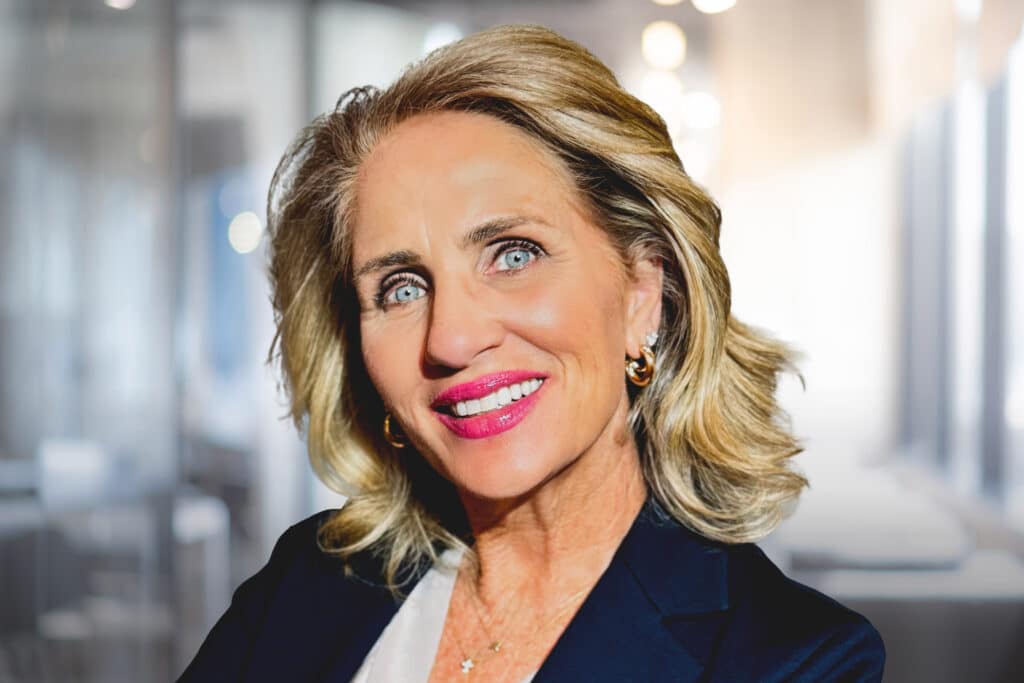
Hanson’s Guardian Sports is a family-owned company dedicated to serving athletes through safety and performance improvements in sports equipment. Major products include the Guardian Cap, PEARL ball and Guardian Infill serving the sports industry.

DLB Associates is a U.S.-based consulting engineering firm specializing in mission-critical and complex built environments. With more than 40 years of expertise, DLB delivers innovative, technology-driven solutions in engineering, commissioning and operations worldwide.
Celebrating entrepreneurial leaders
Now in its 40th year, Entrepreneur Of The Year recognizes the bold leaders who disrupt markets through the world’s most ground-breaking companies, revolutionizing industries and making a profound impact on communities. The program honors those entrepreneurs whose innovations shape the future and pave the way for a thriving economy and a hopeful tomorrow.
The Southeast program celebrates entrepreneurs from Alabama, Georgia, North Carolina, South Carolina and Tennessee.
An independent panel of judges selected 36 finalists for their entrepreneurial spirit, purpose, growth and lasting impact in building long-term value.
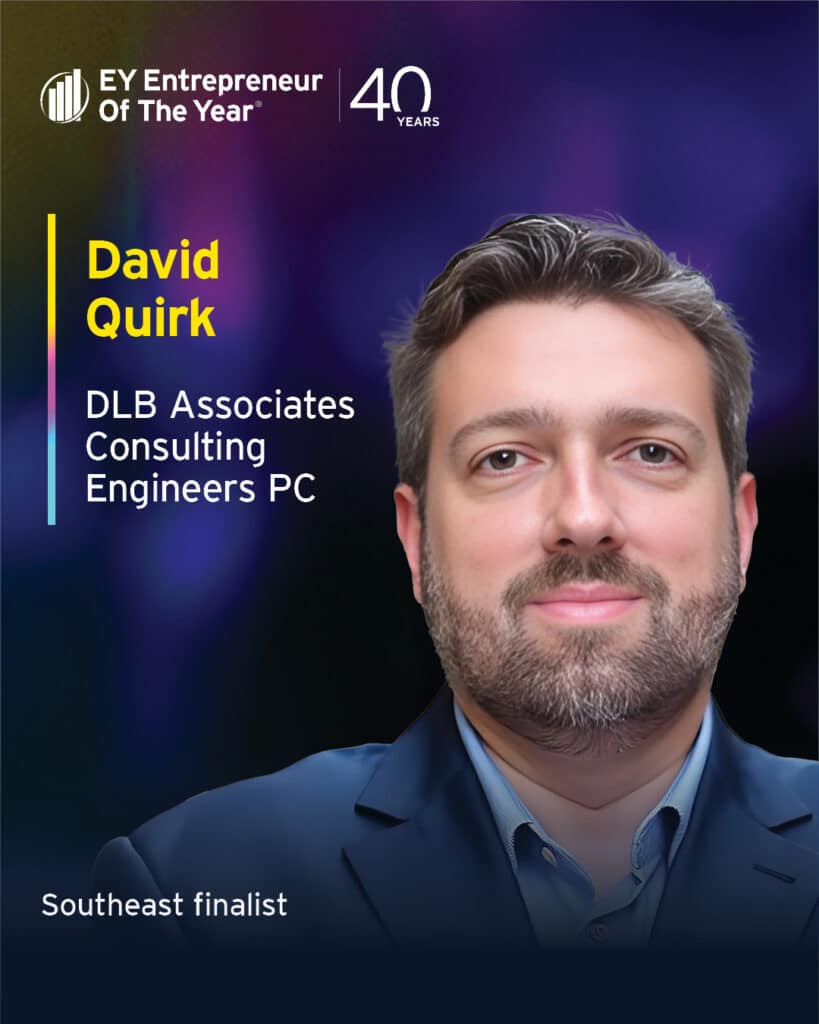
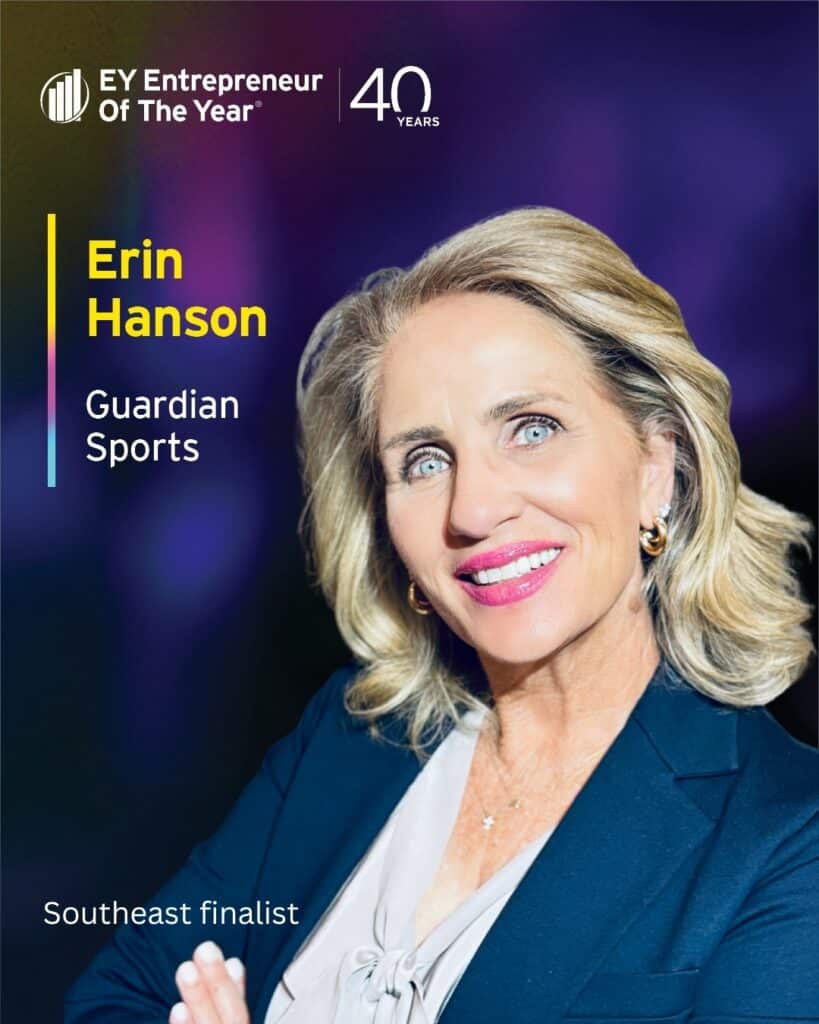
“This year’s finalists are leading examples of innovation, perseverance and resilience, illuminating paths to a brighter future for their industries and communities,” said Chevy Arnold, Entrepreneur Of The Year Southeast Program co-director.
“Their commitment to excellence transforms challenges into opportunities, inspiring us all,” added Kimberly Kicklighter, Entrepreneur Of The Year Southeast Program co-director.
Entrepreneur Of The Year honors many different types of business leaders for their ingenuity, courage and entrepreneurial spirit.
The program showcases original founders who bootstrapped their business from inception or who raised outside capital to grow their company; transformational CEOs who infused innovation into an existing organization to catapult its trajectory; and multigenerational family business leaders who reimagined a legacy business model to strengthen it for the future.
Including Quirk and Hanson, the 2025 Southeast finalists are:
- Marc Hodulich | 29029 | Atlanta, Georgia
- Damon Stafford | Alpine Intel | Charlotte, North Carolina
- Lou Hensley | Aspida | Durham, North Carolina
- Matthew Dent | Buffalo Rock Company | Birmingham, Alabama
- Melanie Little | Colonial Pipeline Company | Alpharetta, Georgia
- Will Bartholomew | D1 Training | Franklin, Tennessee
- Rene Diaz | Diaz Foods | Atlanta, Georgia
- David Quirk | DLB Associates Consulting Engineers PC | Peachtree Corners, Georgia
- Markus Scott | EyeQ Monitoring | Atlanta, Georgia
- Jon Gosier | FilmHedge | Atlanta, Georgia
- John Fitzpatrick | Force Marketing | Atlanta, Georgia
- Dr. Barry Patel | Galt Companies | Atlanta, Georgia
- Dr. Wade Smith | Galt Companies | Atlanta, Georgia
- Charles Gillespie | Gambling.com Group | Charlotte, North Carolina
- Kevin McCrystle | Gambling.com Group | Charlotte, North Carolina
- Mike Griffin | Griffin Brothers Companies | Cornelius, North Carolina
- Erin Hanson | Guardian Sports | Peachtree Corners, Georgia
- Dan Beem | Hissho Sushi | Charlotte, North Carolina
- Aaron Siegel | Home Team BBQ | Charleston, South Carolina
- Marc Murphy | Ignite Digital Services | Charleston, South Carolina
- Miller Chalk | Inglett & Stubbs, LLC | Mableton, Georgia
- Liza Rodewald | Instant Teams | Southern Pines, North Carolina
- Stephen Andresen | McClancy Foods & Flavors | Fort Mill, South Carolina
- Travis LeFever | Mission Mobile Medical Group | Greensboro, North Carolina
- Cyrus Mojdehi | Northway Homes | Charlotte, North Carolina
- Connor Ryan | NutraSky | Alpharetta, Georgia
- Fritz Owens | OTR Solutions | Roswell, Georgia
- Christopher Chuang | Relay, Inc. | Raleigh, North Carolina
- Kurt Jacobus | restor3d, Inc. | Durham, North Carolina
- Tom Kendrot | Shearwater Health | Nashville, Tennessee
- Teak Shore | Southern Lighting Source | Cumberland, Georgia
- Cindy Eckert | Sprout Pharmaceuticals | Raleigh, North Carolina
- Bryan Moore | TalkShopLive Inc. | Nashville, Tennessee
- Tina Moore | TalkShopLive Inc. | Nashville, Tennessee
- Igor Marinelli | Tractian | Atlanta, Georgia
- Joan Butters | Xsolis | Franklin, Tennessee
You can learn more about the finalists at ey.com/en_us/entrepreneur-of-the-year-us/southeast/winners-finalists.
Regional award winners will be announced on June 25 during a special celebration. The winners will then be considered by the national independent panel of judges for the Entrepreneur Of The Year National Awards, which will be presented in November at the annual Strategic Growth Forum®, one of the nation’s most prestigious gatherings of high-growth, market-leading companies.

About Entrepreneur Of The Year
Founded in 1986, Entrepreneur Of The Year has celebrated more than 11,000 ambitious visionaries who are leading successful, dynamic businesses in the U.S., and it has since expanded to nearly 60 countries globally.
The U.S. program consists of 17 regional programs whose panels of independent judges select the regional award winners every June. Those winners compete for national recognition at the Strategic Growth Forum® in November where national finalists and award winners are announced.
The overall national winner represents the U.S. at the EY World Entrepreneur Of The Year™ competition.
For more about the award, visit ey.com/us/eoy.
Related
Business
SCB Construction Group Partners with CGA Reps on New Peachtree Corners HQ
Published
4 weeks agoon
April 15, 2025
SCB Construction Group, freshly rebranded from SteelCo, secures construction project with CGA Reps for new office HQ in Peachtree Corners
SCB Construction Group has announced a strategic partnership with CGA Reps to build a new office headquarters in Peachtree Corners. The project, encompassing approximately 26,000 square feet of innovative workspace, marks a significant milestone in advancing CGA Reps’ corporate vision while showcasing SBA Construction Group’s commitment to delivering transformative construction solutions.
In collaboration with Oakley Real Estate Partners — serving as developers of the project on behalf of CGA Reps — this venture reflects a united effort to bring cutting-edge design (from Smallwood architecture firm) and operational excellence to the commercial kitchen equipment industry.
The announcement follows several high-profile projects for SCB Construction Group in 2024, including a 72,500-square-foot manufacturing center and headquarters for Process Equipment & Controls, an impressive interior build-out for Courtesy Ford Conyers’ commercial service center and the Phase 1 completion for StoreEase Loganville — recently honored as a 2024 Smart Facility of the Year by Modern Storage Media.
A bold new chapter for CGA Reps
The new 25,890-square-foot headquarters is designed to be more than just a workplace — it is envisioned as an inspiring environment that serves both client engagements and employee creativity. CGA Reps is recognized as an industry expert in commercial kitchen equipment, representing leading manufacturers, warehousing, distributing and installing everything from fryers to commercial walk-in freezers.
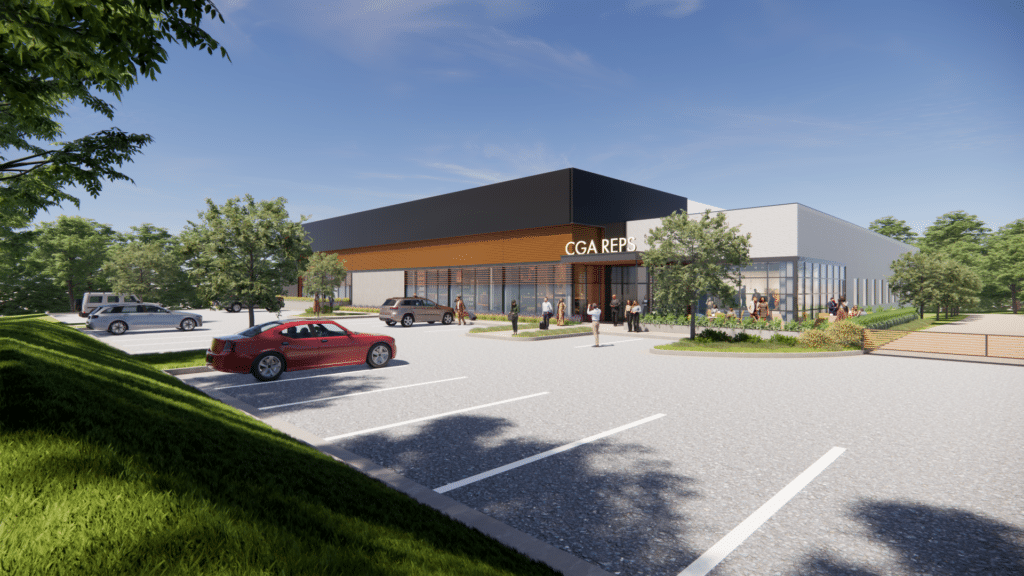
The facility’s design reflects this expertise, featuring a dedicated approximately 9,000-square-foot showroom kitchen that will host equipment demonstrations, tradeshows and webinars. This dynamic space will allow CGA Reps to showcase its comprehensive product range and provide clients with hands-on experiences of the latest commercial kitchen innovations.
A standout feature of the project is its innovative approach to stormwater management. With the site comprising only three acres, sufficient space for a traditional detention pond does not exist. To overcome this challenge, the design includes an underground detention system located beneath the truck court to efficiently handle all stormwater runoff.
This solution not only maximizes the use of the available land but also reinforces CGA Reps’ commitment to sustainable practices.
“We are excited to embark on this project with CGA Reps,” said Jay Bailey, CEO of SCB Construction Group. “This partnership underscores our commitment to customer excellence in design and construction, and it is a testament to the trust our clients place in our ability to deliver projects that not only meet but exceed expectations.”
Delivering excellence through proven expertise
SCB Construction Group’s track record in 2024 has been nothing short of remarkable. Earlier in the year, the company completed a 72,500 square foot manufacturing center for Process Equipment & Controls, integrating office space within a dynamic production facility.
This project was celebrated for its innovative design that balanced operational efficiency with a modern aesthetic, utilizing IMP panels to mimic tilt-up concrete, setting new standards for manufacturing environments.
Similarly, the interior build-out for Courtesy Ford Conyers’ commercial service center demonstrated SCB Construction Group’s ability to transform conventional spaces into functional and attractive environments that cater to both customer and staff needs.
The company’s commitment to quality and precision was again evident in the successful Phase 1 completion for StoreEase Loganville. This project, which recently earned the distinction of a 2024 Smart Facility of the Year by Modern Storage Media, highlights SCB Construction Group’s forward-thinking approach to construction and design, incorporating smart technologies and design that enhance sustainability and operational efficiency.
A rebranding that reflects a vision for the future
In a move that signals its evolution and growth, SCB Construction Group has recently rebranded from its former identity, SteelCo Buildings, as it spins off its construction division. This strategic rebranding is not merely cosmetic — it represents a renewed commitment to capabilities, credibility and client-focused service.
The refreshed brand is anchored by a new tagline “Deep Expertise, High Expectations” and a clear brand promise that communicates the company’s mission: to craft exceptional construction experiences based on precision, innovation and trust.
“Our rebranding is about more than just a new name or logo; it’s a renewed promise to our clients and communities,” explained Robert Lee, marketing director at SCB Construction Group. “We believe that our updated brand identity, including our invigorated tagline and mission statement, encapsulates our dedication to pushing the boundaries of design and construction. It reflects our commitment to creating spaces that are as inspiring as they are functional.”
Transforming spaces to inspire and connect
The new headquarters for CGA Reps is expected to become a landmark facility in Peachtree Corners. Beyond its impressive architectural design and advanced construction techniques, the building is planned as a hub for innovation and collaboration.
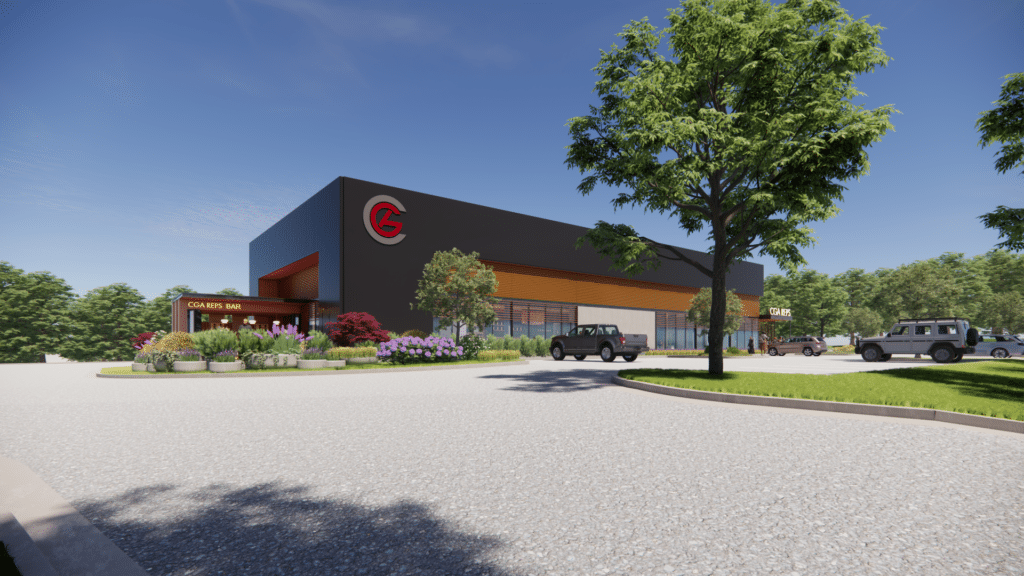
The interior build-out will include dynamic client reception areas, interactive meeting rooms, and dedicated spaces designed to foster creativity and teamwork among employees. The layout is crafted to ensure that every area of the facility contributes to a productive and inspiring work environment.
“By investing in this state-of-the-art facility, CGA Reps is making a strong statement about the future of work,” said Bryan Young, VP of construction at SCB Construction Group. “Our team is dedicated to designing and building spaces that not only serve the immediate needs of our clients but also create environments that motivate and inspire. The new headquarters will be a testament to that vision.”
Looking ahead
The partnership between SCB Construction Group and CGA Reps marks a significant step forward for both companies. As SCB Construction Group continues to build on its legacy of excellence and innovation, this project is poised to set a new benchmark for modern office headquarters design in the region.
With a strategic focus on creating spaces that inspire, connect and drive success, the future looks promising for both SCB Construction Group and its esteemed partner, CGA Reps.
For more information on the new headquarters project or to learn more about SCB Construction Group’s portfolio, visit scbcg.com.
Related
Read the Digital Edition
Subscribe
Keep Up With Peachtree Corners News
Join our mailing list to receive the latest news and updates from our team.
You have Successfully Subscribed!

Digital Edition

Official City Merchandise Line Debuts This Saturday at Town Green

Paul Duke STEM High School Student Earns CGO Scholarship

World Blood Donor Day Starts Here: Theo’s Miracle, Katherine’s Mission [Podcast]

Executive Function: A Tribute to Working Moms

Peachtree Corners Grows Business Opportunities Through Economic Development

Peachtree Corners Hosts Discussion About the Future of Local Policing

Simpson Elementary Marks Exceptional Children’s Week

Atlanta’s Dog Howl-O-Ween Festival Moving to Peachtree Corners for 2025

D1 Training Brings New Fitness Concept to Peachtree Corners

Peachtree Corners Hosts Discussion About the Future of Local Policing

City of Peachtree Corners Awarded Certificate of Achievement From GFOA for Seventh Straight Year

Simpson Elementary Marks Exceptional Children’s Week

Executive Function: A Tribute to Working Moms

Official City Merchandise Line Debuts This Saturday at Town Green

Peachtree Corners Grows Business Opportunities Through Economic Development

Light up the Corners [Video]

Capitalist Sage: Business Leadership in Your Community [Podcast]

Cliff Bramble: A Culinary Adventure through Italy

Top 10 Brunch Places in Gwinnett County

A Hunger for Hospitality

THE CORNERS EPISODE 3 – BLAXICAN PART 1

Top 10 Indoor Things To Do This Winter

The ED Hour: What it takes to Remove Barriers from Education







